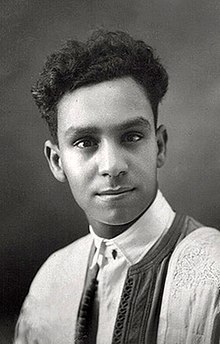Aboul-Qacem Echebbi
This article needs additional citations for verification. (December 2009) |
Abul-Qasim Al Shabi أبو القاسم الشابي | |
|---|---|
 | |
| Born | 24 February 1909 |
| Died | 9 October 1934 (aged 25) |
| Occupation | poet |
Abou-Al-kacem El-chebbi (Arabic: أبو القاسم الشابي, pronounced Abo Al Qassim Al Shabbi) (* 24. February 1909 - 9 October 1934) was a Tunisian poet. He is probably best known for writing the final two verses of the current National Anthem of Tunisia, Humat al-Hima (Defenders of the Homeland), that was written originally by the Egyptian poet Mustafa Sadik el-Rafii.
Echebbi was born in Tozeur, Tunisia, on 24 February 1909, the son of a judge. He obtained his attatoui diploma (the equivalent of the baccalauréat) in 1928. In 1930, he obtained a law diploma from the University of Ez-Zitouna. The same year, he married and subsequently had two sons, Mohamed Sadok, who became a colonel in the Tunisian army, and Jelal, who later became an engineer.
He was very interested in modern literature, in particular, translated romantic literature, as well as old Arab literature. His poetic talent manifested itself at an early age and this poetry covered numerous topics, from the description of nature to patriotism. His poems appeared in the most prestigious Tunisian and Middle-Eastern reviews. His poem To the tyrants of the world became a popular slogan chant during the 2011 Tunisian and subsequently Egyptian demonstrations.[1]
Echebbi died on 9 October 1934 at the Habib-Thameur Hospital in Tunis, Tunisia following a long history of cardiac disorders. His portrait is on the current 30 DT note.
Works
- Ela Toghat Al Alaam (To the tyrants of the world),
- Aghani Al-Hayat (canticles of the life),
- Muzakkarat (Memories),
- Raséil (A collection of letters),
- Sadiki (A collection of seminars given to the Alumni Association of the college; caused quite a lot of controversy among conservative literary groups)
